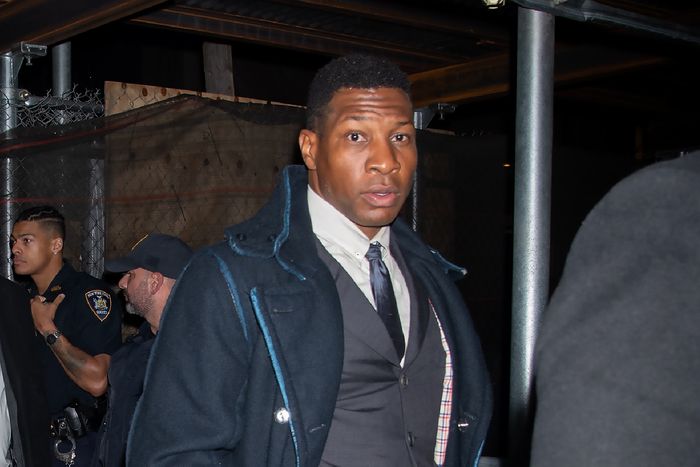
During closing arguments in Jonathan Majors’s domestic-violence trial on Thursday in Manhattan, two narratives emerged that presented an uncomfortable referendum on how society should handle alleged violence against women: one conspiratorial and teary, the other grounded and plain. For the prosecution, Majors’s alleged pattern of abusive behavior toward Grace Jabbari culminated on March 25 during an altercation in a car. Everything else — Jabbari’s inaction following past incidents of behavior, her actions after the purported incident — was flotsam and jetsam, a distraction. Did he or did he not assault her in and around the car? That, they said, was it. For the defense, it was the everything else that really mattered. Indeed the defense, which leaned heavily on purported racial bias in Majors’s case, almost treated the alleged assault as an afterthought: She was drunk and prosecutors are racist. A few years after the Me Too movement, the same tropes that we saw in rape trials continue to play out in this high-profile domestic-violence trial: Women lie and society is hell-bent on taking down a Good Man.
During her closing statement, prosecutor Kelli Galaway told jurors that this case boiled down to four words: “Control, domination, manipulation, and abuse.” She said the trial is only about what happened that night in and outside the car. Jabbari repeatedly made clear that she did not want to implicate Majors. “She didn’t want to report to law enforcement, she didn’t call 911,” Galaway said. She recognized that Majors was the person who called 911, and said, “There’s nothing wrong with appreciating the fact that the defendant called 911.” Galaway noted that Jabbari was incredibly private and had nothing to gain from coming forward.
“This case is the people of the State of New York versus Jonathan Majors. It is not Grace Jabbari versus Jonathan Majors,” Galaway said. As for the scorned ex theory, “This is not consistent with the testimony that you heard.” She argued: “This is not a revenge plot to ruin the defendant’s life, his career, to take everything away from him.” The events and injuries, Galaway said, were “not consistent with a premeditated plan of revenge.” If anything, Jabbari’s unwillingness to immediately say that Majors was the perpetrator was a testimony to her credibility.
Galaway did her best to dispel misconceptions about domestic violence and reporting abuse, as Jabbari was scrutinized by the defense for not being more straightforward with police. “When the defendant had behaved in a way that you are hearing previously, in public, he had told her not to speak about it, to anyone, that it would ruin their relationship,” Galaway said. “Ms Jabbari understood this. How did this impact her? She didn’t want to tell anyone what was going on.” As for defense claims that Jabbari was aggressive toward Majors, she noted the nearly two years of their increasingly abusive relationship, and how that could prompt a strong reaction over cheating. “Her actions could not be taken in an isolated vacuum.”
The defense closings tried to paint Jabbari as an unhinged drunk and insisted Majors was the victim. “Jonathan Majors is innocent and Grace is a liar,” said Majors’s lead attorney, Priya Chaudhry. Chaudhry insisted it was “medically impossible” that Jabbari could have sustained the injuries because of Majors. She cast Jabbari as a woman lacking morals, saying that she “had a ball” at the nightclub with strangers she encountered after the incident. Chaudhry noted that Jabbari was “smoking, illegally, in a nightclub with her right hand, her left busy holding her glass of Champagne,” referring to Jabbari’s claims of an injured hand. “She was revenge partying and charging Champagne to the man she’s angry with and treating these strangers to fancy Champagne she bought with Jonathan’s credit card.”
Chaudhry repeatedly intimated the case was about racial bias, as she has done previously. “They bought her white lies. They bought her big lies. These prosecutors brought prosecutors white lies. Her big lies. And all her pretty little lies,” Chaudhry said of Jabbari. “If you believe Grace, then despite Jonathan Majors telling her how dangerous it is for a Black man to call the police in America, despite that, he beat her badly in a car that was both in his own name and then he called 911 himself … if you believe Grace, then Jonathan caused these injuries and then he told the 911 operator about her injuries, and then he told the cops who showed up at his apartment that they had an argument the night before.”
“His fear of what happens when a Black man in America calls 911 came true,” she said. “And now we’re here.” Shortly after Chaudhry delivered this line, Majors appeared to cry and started dabbing tears away with a tissue. The courtroom theatrics took an even sharper turn when Chaudhry herself choked up at the lectern. “You are here to end this nightmare for Jonathan Majors,” Chaudhry told jurors, her voice cracking. “You are here to see what is obvious, what this evidence shows … Jonathan Majors is innocent.” When her closing ended, Chaudhry returned to the defense table. She sat and dabbed her eyes.
The most striking evidence in Majors’s case was Jabbari’s four days on the stand. Jabbari described how their whirlwind relationship after meeting on the set of Marvel’s Ant-Man and the Wasp: Quantumania in 2021 quickly spiraled into controlling and manipulative behavior. “He said that he was a monster and wanted to kill himself and had actions in place to do so,” Jabbari told jurors. Jabbari testified that guilt and fear for his well-being discouraged her from leaving the allegedly abusive relationship.
Jabbari’s description of the incident this spring suggests that it unfolded over his alleged infidelity. As they were returning to their Chelsea home from a Brooklyn restaurant, Jabbari said, an argument over an alleged text message on Majors’s phone resulted in a physical confrontation, including what Jabbari described as a “pretty hard blow across my head,” and Jabbari leaving the vehicle.
Prosecutors showed jurors video of Majors picking up Jabbari as she leaves the SUV, and trying to hoist her back inside. The recording then seems to show Majors taking her by the hand and crossing the street. Majors then takes off and Jabbari follows. As Jabbari tells it, she ran into a group of strangers outside a nearby apartment building and ended up spending the evening with them.
When Jabbari tried to sleep that night, the pain started to settle in, she said. She took two over-the-counter sleeping pills, to no avail. “I noticed that the hair on my head was, like, stuck behind my ear … It was like dried blood, I guess. I was just like, Ugh, what is this?” Her finger, which was later found to be fractured, “turned more or less black.” Majors had called the police after finding her sleeping in the walk-in closet of their home, but she didn’t tell the officers exactly what happened because Majors was in the next room.
“I wanted to say: ‘Help me, please,’” Jabbari recalled, breaking into tears. But, she never imagined that this help would be from police, given Majors’s past admonitions against them. “I think, just things he had told me in the past of not trusting police, and what they would do to him, as a Black man, and I didn’t want to put him in that situation.” Majors was arrested. His trial involves misdemeanor charges of assault and harassment.
Prosecutors presented photos of a bloody gash behind Jabbari’s ear as well as pictures of her blackening, swollen finger. They played audio for jurors in which Majors, upset that she’d returned home with a friend following drinks at a pub, berated her for not living up to her standards, insisting she be more like Coretta Scott King, and emphasizing that he is a “great man.”
Majors’s defense has tried to undermine Jabbari by suggesting that she drank too much and had misgivings about going to cops, undermining her claims of assault. In grilling Jabbari on why she didn’t want to be hospitalized, Majors’s lawyers opened the door for once-inadmissible texts to be shown in court. Those texts, which came in the wake of Jabbari’s recalling of the September 2022 post-pub row, showed Majors urging her not to seek medical help. “I fear you have no perspective of what could happen if you go to the hospital. They will ask you questions and as I don’t think you actually protect us it could lead to an investigation even if you do lie and they suspect something.”
Majors’s defense called three witnesses. Among them was NYPD detective Ronnie Mejia, who took Majors’s cross-complaint against Jabbari in June. Majors’s defense played up the arrest as part of their contention that she was the aggressor. While Jabbari was arrested in October, the case went nowhere: Before she was arrested, the Manhattan district attorney’s office made clear that they wouldn’t pursue a case against her. It was dropped.


